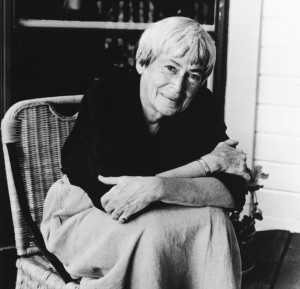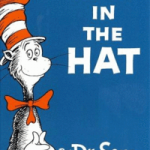[fusion_builder_container hundred_percent=”yes” overflow=”visible”][fusion_builder_row][fusion_builder_column type=”1_1″ background_position=”left top” background_color=”” border_size=”” border_color=”” border_style=”solid” spacing=”yes” background_image=”” background_repeat=”no-repeat” padding=”” margin_top=”0px” margin_bottom=”0px” class=”” id=”” animation_type=”” animation_speed=”0.3″ animation_direction=”left” hide_on_mobile=”no” center_content=”no” min_height=”none”]
Science fiction and fantasy are among the most popular genres in both film and book publishing, but they are often underrepresented in the English Language Arts offerings in the secondary classroom. There are a few exceptions, and on occasion, an Ursula Le Guin short story such as “The Ones Who Walk Away from Omelas” (1973) may be included in an anthology.
Students who discover Le Guin on their own may be familiar with her novels and novel series: The Lathe of Heaven, A Wizard of Earthsea, The Left Hand of Darkness, or The Dispossessed
Le Guin uses science fiction and fantasy genres to creatively explore psychology, culture, and society. Many of her short stories are in classroom anthologies. In an interview in 2014 about these genres, she noted:
” … the task of science fiction is not to predict the future. Rather, it contemplates possible futures.”
When LeGuin was asked to deliver a commencement address in May of 1983 at Mills College, a liberal arts woman’s college in Oakland, California; she spoke about confronting “the male power hierarchy” by “going our own way.”
Her “A Left-Handed Commencement Address” represents a feminist point-of-view on the history of a man-dominated culture. She confronts how language, specifically public speaking language, is “men’s language” in the opening of the speech and she thanks the audience:
“for offering me a rare chance: to speak aloud in public in the language of women.”
In the second paragraph, she develops her thesis:
“Intellectual tradition is male. Public speaking is done in the public tongue, the national or tribal language; and the language of our tribe is the men’s language. Of course women learn it. We’re not dumb.”
During the speech she considers the nature of women as essentially peaceful and urges women to reject the competitive, black and white world of “Macho-man” in order to live “without the need to dominate, and without the need to be dominated.”
Le Guin’s spells out her hope for the women and men in her audience in making this choice to live as “natives”:
“So what I hope for you is that you live there not as prisoners, ashamed of being women, consenting captives of a psychopathic social system, but as natives”
This speech is ranked #82 out of 100 of America’s Top Speeches on the American Rhetoric website. The speech is 1,233 words with a readability grade reading level of 7.4 (Flesch-Kincaid Reading Ease 75.8) although the material is for a more mature audience. Reading the speech aloud takes about six minutes.
Using a speech in the secondary classroom also meets the Common Core Literacy Standards for English Language Arts that require students to determine word meanings, appreciate the nuances of words, and steadily expand their range of words and phrases.
This speech offers the opportunity to study how rhetorical literary devices such as
parallelism are effectively used in a speech.Parallelism is the use of components in a sentence that are grammatically the same; or similar in their construction, sound, meaning or meter. The are multiple examples of parallelism in this speech as seen in these examples:
“..can’t play doctor, only nurse, can’t be warriors, only civilians, can’t be chiefs, only Indians.”
“You will find you’re weak where you thought yourself strong. You’ll work for possessions and then find they possess you. You will find yourself — as I know you already have — in dark places, alone, and afraid.”
and
“I hope you tell them to go to hell and while they’re going to give you equal pay for equal time. I hope you live without the need to dominate, and without the need to be dominated. I hope you are never victims, but I hope you have no power over other people.”
In 1983, Ursula Le Guin urged a graduating class to contemplate a possible future with this speech. Contemplating futures is what educators want students to do…a great speech can help.[/fusion_builder_column][/fusion_builder_row][/fusion_builder_container]





